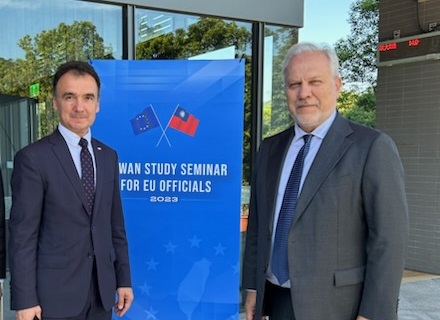At the invitation of the Ministry of Education of Taiwan, the Secretary General of the Copernican Academy, Prof. Dr. Krzysztof Górski, visited Taipei, where he had the opportunity to learn about good practices in the field of cooperation between the education and business sectors in the host country.
The Secretary General of the AK was one of the guests of a programme organised by the Ministry of Education of Taiwan, where representatives of European Union countries familiarise themselves with, among other things, the principles of cooperation between the education sector and business in the model introduced by Taipei. Prof. Górski was the first Polish representative to participate in the programme.
During the very first days of the visit, the Secretary-General took part in meetings with the Vice-Ministers of Foreign Affairs and Education on Taipei’s existing cooperation with European countries and the prospects for further contacts, with a particular focus on Central and Eastern European countries.
– Poland and Taiwan seem to be natural partners, we have economies of comparable size and at the same time a mutual understanding in the face of a difficult geopolitical situation,” stresses Prof. Krzysztof Górski, pointing out that strengthening relations with Taipei may create opportunities for Polish business and new educational prospects for students.
Interviews with representatives of Academia Sinica
The visit to Taipei also provided an opportunity for another meeting between the AK Secretary General and Academia Sinica President Dr. James C. Liao.
The talks with representatives of this Taiwanese national academic institution followed on from a meeting held in Warsaw in July. At that time delegates from Taiwan took part in talks with Prof. Górski and Deputy Minister of Education and Science Tomasz Rzymkowski.
As in Warsaw in July, this time too representatives of Academia Sinica and the AK Secretary General discussed opportunities to expand contacts between institutions in Taiwan and Poland and exchanged good practices in cooperation between the education and business sectors. The AK Secretary General also had the opportunity to visit the Institute of Astronomy located on the premises of Academia Sinica.
Business cooperation with universities
The visit to Taiwan also included visits to several universities on the island – including the National Cheng Kung University, where a member of the Chamber of Medical Sciences of the Copernicus Academy and former president of the university, Prof Huey-Jen Jenny Su, presided.
As part of the programme, the guests also visited National Taiwan University, National Chengchi University and National Tsing Hua University, where they met with university authorities and representatives from international cooperation.
As Prof. Górski emphasises, the educational model promoted in Taiwan – which is based on combining education with practical work preparation – allows for a smooth transition of graduates from schools and universities to new employers. An example of the introduction of such solutions is the high school – Jhangshu International Creative Technical High School. – In this way, young people prepare for work in a specific industry and when they enter the market, most already have a job secured, explains the AK Secretary General.
Corporations support the education of young people
During the visit, EU representatives also had the opportunity to visit the headquarters of Taiwan’s world-renowned chip specialist, Taiwan Semiconductor Manufacturing Company Limited (TSMC).
As Prof. Górski explains, visits to Taiwanese technology parks and companies such as TSMC show how well developed the cooperation between universities and large corporations that support the education process of young people is there.
– The companies collaborate in the preparation of the practical education process, in this case (TSMC’s concern – ed.) almost at the production lines, allowing students to work in their laboratories, and at the same time it is co-organised by the universities, reports the AK Secretary General, pointing out that TSMC has collaborated with nine Taiwanese universities since 2019.
– These student programmes last for two years so the first graduates have already hit the job market and are successful, and now TSMC is interested in expanding this programme to other countries, adds Prof Górski.
